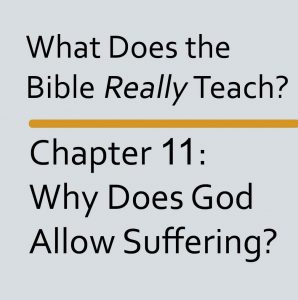The Watchtower seems to have anticipated my criticism of its “rebellious student” analogy, because paragraph 15 of Chapter 11 of “Bible Teach” (p. 112) asks, “Why, though, has Jehovah allowed suffering to go on for so long? And why does he not prevent bad things from happening?”
The same paragraph gives the Watchtower’s first explanation—that Jehovah “has not stopped Satan and those who side with him from trying to prove that they are right. Allowing time to pass has thus been necessary. In the thousands of years of human history, mankind has been able to try every form of self-rule, or human government. Mankind has made some advances in science and other fields, but injustice, poverty, crime, and war have grown ever worse. Human rule has now been shown to be a failure.”
My rebuttal to that is that it has been clear since Adam’s first sin that Satan and man are terrible rulers and that their ways are a disaster. Thousands of years are not required for the purpose of proving that.
I think a far better answer to the “why so long” question is given in 2 Peter 3:9: “Jehovah is not slow concerning his promise, as some people consider slowness, but he is patient with you because he does not desire anyone to be destroyed but desires all to attain to repentance.”
Paragraph 16 (p. 112) gives its second reason: “If God were to prevent horrible crimes… would he not, in effect, be supporting the case of the rebels? Would God not be making people think that perhaps humans can govern themselves without disastrous results? If Jehovah were to act in that way, he would become party to a lie. However, it is impossible for God to lie.’—Hebrews 6:18.”
My rebuttal to that would be a series of questions:
- Hasn’t God intervened in one way or another throughout history in order to ameliorate the consequences of sin?
- Didn’t he give Israel a Law code instituting the death sentence for many crimes?
- Didn’t he personally rain down destruction on Sodom and Gomorrah?
- Did that somehow lead people to conclude that the rule of Satan and of rebellious humans really wasn’t so bad after all?
Additionally, is all suffering caused by rebellious angels and rebellious humans? If that is what Witnesses claim, then you might ask them to explain these (and similar) verses:
- Isaiah 45:7: “I form light and create darkness, I make peace and create calamity; I, Jehovah, am doing all these things.”
- Amos 3:6: “…If a calamity occurs in the city, is it not Jehovah who has acted?”
- Ecclesiastes 7:14: “On a good day, reflect this goodness, but on the day of adversity, consider that God made the one as well as the other, so that men cannot be certain of anything that will happen to them in the future.”
Paragraph 17 (pp. 112-113) says that Jehovah “can and will undo the effects of mankind’s suffering. As we have already learned, the ruining of our planet will be undone by the turning of the earth into Paradise. The effects of sin will be removed through faith in Jesus’ ransom sacrifice, and the effects of death will be reversed by means of the resurrection.”
As Christians, we can agree that evil and suffering will not continue indefinitely. One day, God will intervene in a dramatic way.
However, the picture is not as rosy as this chapter portrays it. Not all of the effects of the rebellion will be reversed. Billions of lives will have been ruined for all eternity.
Remind the Witnesses of Jesus’ warning in Matthew 7:13-14: “Go in through the narrow gate, because broad is the gate and spacious is the road leading off into destruction, and many are going in through it; whereas narrow is the gate and cramped the road leading off into life, and few are finding it.”
Next week, we’ll look at what the Watchtower says about man’s free will.


Leave a Reply
Be the First to Comment!